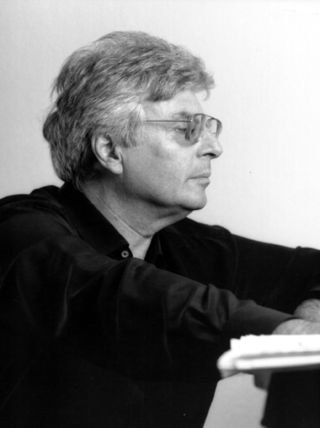Related Research Articles
The Berlin Philharmonic is a German orchestra based in Berlin. It is one of the most popular, acclaimed and well-respected orchestras in the world.
Caroline Dale is a widely recorded British cellist who currently plays principal cello for the English Chamber Orchestra and London Metropolitan Orchestra. She has also performed music for numerous films and played with a wide range of pop and rock musicians, including Joan Armatrading, Peter Gabriel, David Gilmour, David Gray, Oasis, Simply Red, Sinéad O'Connor and U2.

Toshio Hosokawa is a Japanese composer of contemporary classical music. He studied in Germany but returned to Japan, finding a personal style inspired by classical Japanese music and culture. He has composed operas, the oratorio Voiceless Voice in Hiroshima, and instrumental music.
Jolyon Brettingham Smith was a British composer, conductor, performer, author, and radio presenter, and a university teacher at the Berlin University of the Arts.

Graham Waterhouse is an English composer and cellist who specializes in chamber music. He has composed a cello concerto, Three Pieces for Solo Cello and Variations for Cello Solo for his own instrument, and string quartets and compositions that juxtapose a quartet with a solo instrument, including Piccolo Quintet, Bassoon Quintet and the piano quintet Rhapsodie Macabre. He has set poetry for speaking voice and cello, such as Der Handschuh, and has written song cycles. His compositions reflect the individual capacity and character of players and instruments, from the piccolo to the contrabassoon.
The International Classical Music Awards (ICMA) are music awards first awarded 6 April 2011. ICMA replace the Cannes Classical Awards formerly awarded at MIDEM. The jury consists of music critics of magazines Andante, Crescendo, Fono Forum, Gramofon, Kultura, Musica, Musik & Theater, Opera, Pizzicato, Rondo Classic, Scherzo, with radio stations MDR Kultur (Germany), Orpheus Radio 99.2FM (Russia), Radio 100,7 (Luxembourg), the International Music and Media Centre (IMZ) (Austria), website Resmusica.com (France) and radio Classic (Finland).
Spectrum Concerts Berlin is a German classical chamber music ensemble.
Xenia Jankovic is a Serbian-Russian cellist.

Frank Michael Beyer was a German composer.
The Carl Philipp Emanuel Bach Chamber Orchestra was a German chamber orchestra, founded in 1969 in Berlin, dedicated to the music of Carl Philipp Emanuel Bach and his contemporaries.
Georg Faust is a German cellist, he was the principal cellist of the Berlin Philharmonic from 1985 to 2012.

Li-Wei Qin is a Chinese-Australian cellist. He won the Silver Medal at the 11th International Tchaikovsky Competition in 1998, and First Prize at the 2001 International Naumburg Competition in New York.
Konstantía Gourzí is a Greek composer and conductor. She is professor of ensemble conducting and new music at the University of Music and Performing Arts Munich.
Peter Bruns is a German cellist and university professor.

Wolfgang Boettcher was a German classical cellist and academic teacher. He was principal cellist of the Berlin Philharmonic, and a founding member of The 12 Cellists of the Berlin Philharmonic. From 1976, he was professor at the Hochschule für Musik Berlin. From 1986 to 1992 he was artistic director of the Sommerliche Musiktage Hitzacker chamber music festival.
Martin Ostertag is a German classical cellist and music educator.
Walter August Wilhelm Schulz was a German cellist, viol player and college teacher. From 1945 to 1948 he was director of the Hochschule für Musik Franz Liszt, Weimar.
Ludwig Hoelscher was a German cellist. He played internationally as a soloist, and was well known as a chamber musician, first playing from 1932 in Elly Ney's piano trio, then in the Strub Quartet and other formations. He was an important cellist of the Nazi era, playing in propaganda concerts and teaching in Berlin and Salzburg. After the World War, he taught at the Musikhochschule Stuttgart and played internationally. He played the world premieres of more than 50 compositions.
Jan Diesselhorst was a German cellist.
Johannes Hans Bastiaan was a German violinist. He was a member of the Berlin Philharmonic for over 40 years. From 1945 to 1970, he served as primarius of the Bastiaan Quartet.
References
- ↑ "Frank S. Dodge- Bio, Albums, Pictures – Naxos Classical Music". naxos.com.
- ↑ "The Atlantic Times :: Archive". atlantic-times.com. Archived from the original on 2015-06-10. Retrieved 2015-06-08.
- ↑ "The Art of Listening; 'Spectrum Concerts' Begins 23rd Season In Berlin". NPR.org. 5 November 2010.
- ↑ "Spectrum Concerts Berlin droht das Aus: Musik in der kleinsten Kammer - Kultur - Tagesspiegel". tagesspiegel.de.
- ↑ "Spectrum: Reviews 1988-2006". spectrumconcerts.com.
- ↑ Matthias Nöther (22 May 2015). "Klassik-Kritik: Kammermusiker schlagen Brücken in die Moderne - Printarchiv - Kultur - Berliner Morgenpost". Berliner Morgenpost - Berlin.
- ↑ "Spectrum Concerts im Kammermusiksaal: Biss in den Butterkuchen - Kultur - Tagesspiegel". tagesspiegel.de.
- ↑ "Classical Net Review - Toch - Chamber Music". Classical Net.
- ↑ present (Wurth group magazine), February 2006 - ″chamber music in Berlin of such breath-taking brilliance″
- ↑ "Frank Dodge". wordpress.com.
- ↑ "Robert Helps - the musician's musician". gramophone.co.uk.
- ↑ "Sehnsucht Musik - Spectrum Concerts Berlin im Kosovo - MUSIK HEUTE". MUSIK HEUTE. 15 October 2013.
- ↑ "Naxos Classical Music - Naxos Album Reviews". naxos.com.
- ↑ "Naxos Classical Music - Naxos Album Reviews". naxos.com.
- ↑ "Naxos Classical Music - Naxos Album Reviews". naxos.com.
- ↑ "Music Kosovo: A Spectrum Concerts Berlin Journey (photo gallery)". Archived from the original on 2015-06-10. Retrieved 2015-06-07.
- ↑ "Ars Kosova Music Competition". Facebook.
- ↑ "Spectrum Concerts Berlin- Bio, Albums, Pictures – Naxos Classical Music". naxos.com.
- ↑ 20 Years Spectrum Concerts Berlin, 1988/2008 - Part 1/4, english version. YouTube. 15 September 2008.
- ↑ "Sehnsucht Musik - Spectrum Concerts Berlin im Kosovo". rbb-online.de.